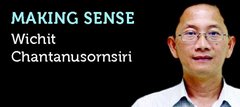
The new package intended for the poor, valued at 38 billion baht issued by the Prayut Chan-o-cha administration ahead of the election, is seen by critics as a populist tactic aimed at maximising political gain. Yet in my opinion, it's time we took a new look or changed our attitude toward populist policies. The fact is that all governments, elected or not, tend to embrace populism and even though some packages may not benefit the middle class, populist policies are just inevitable.
It was Thaksin Shinawatra and the Thai Rak Thai Party that introduced populism on a large scale to Thai politics in 2001. Not only did the populist policies help secure political victory for Thaksin, but they became a surefire way for the tycoon-turned-politician to put his three successors, Samak Sundaravej, Somchai Wongsawat, and Yingluck Shinawatra in power.

Wichit Chantanusornsiri is a senior economics reporter, Bangkok Post.
The long-awaited election, tentatively scheduled for late February, will be the first after the 2014 coup staged by the National Council for Peace and Order. After four-plus years of restoring peace through heavy handed military methods, the political fight will be fierce, with each political faction flaunting populism to make political gains.
As we have learned, all governments -- elected or not -- have resorted to populism, with the help directed at the poor, even though it is not a long-term measure that can do away with the root cause of poverty. But it can at least can ease their financial plight, albeit temporarily.
For the past 17 years, populism has become part and parcel of Thai politics, as all political parties have adopted populist policies. It is true that populism cannot eradicate poverty, but it can help ease the suffering of the poor. Since the poor make up a large group of people of many million, we cannot leaving them out in the cold. Nor can we keep them waiting for long-term assistance that can eradicate poverty once and for all.
But what kind of populism should we accept? Of course, we cannot tolerate the irrational populism that left the country on the verge of bankruptcy, like some Latin American countries.
To be fair, some of Thaksin's populist policies at the beginning of his political career, including the 30-baht healthcare coverage that gives the poor access to universal health service; or the village fund and income-generating Otop projects, have become core state policies that other political parties dare not extinguish.
But those projects are different from dubious ones, such as the rice-pledging scheme and tax exemption for first-car buyers during the Yingluck government. The schemes inflicted a heavy toll on the economy, with 600-700 billion baht in total losses, equal to half the amount the country lost in the 1997 economic crisis.
The serious flaw of the rice-pledging scheme lay in the fact that the price intervention, with the state offering more than twice the market value, resulted in the government buying, as opposed to pledging the rice, as no farmers bothered to buy back the rice from the state.
According to the TDRI, the Yingluck government used 800.57 billion baht to buy paddy rice from farmers. When other costs like storage fees, rice quality inspection, and others are included, the amount went up to 900 billion baht. The Finance Ministry will have to spend 16 years to clear the debt from that scandalous scheme.
The first-car owner scheme was no less controversial. The state had to pay 100 billion baht in tax redemptions for buyers of cars with 2,000cc engines. These people are members of the middle class, not the poor.
That said, we have to admit that the Prayut government has also spent a huge sum of money for several populist projects, totalling over 100 billion baht. We must not forget that it is Somkid Jatusripitak -- an architect of populist policies for Thaksin -- who designed populist policies for Gen Prayut.
Yet, the difference in the populism promoted by the two regimes is that Gen Prayut has a system to screen the eligibility of recipients. For example, the Prayut government requires the poor to register to obtain a welfare card.
Some assistance packages are temporary, aimed at curing immediate problems like plummeting farm prices, while others involve longer-term extended assistance. More importantly, they include vocational training for the poor, so they can upgrade their skills which can be used to free themselves from the trap of poverty.
Even though we may not agree with populist policies, there are times when we find it difficult to reject them, especially well-designed ones that aim to help the poor stand on their own two feet, and reduce dependence on the state.
But on top of that, it is necessary for the state to think about long-term policies to help Thailand better adapt to change in the face of the the digital age and the rise of the Internet of Things, which will make Thailand more attractive to investors. To achieve that, we must go beyond populism and do more to promote socio-economic development.
